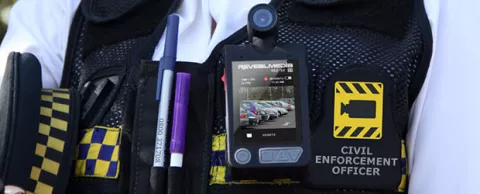
About 70,000 body cameras are worn by police officers across the US -- a number that could soon double with a White House plan to expand their usage. But that may represent only the tip of the iceberg as a growing number of cities worldwide are starting to think that body cameras aren’t just for police officers.
From the U.S. to the UK, a handful of cities are planning to make everyone from parking officers and animal control agents to building and fire inspectors wear them. As with cameras for police officers, they are seen as a means to resolve disputes and improve accountability and safety. But privacy watchdogs worry the rush to record everything is a disturbing trend.
Improving safety for threatened workers
The city of Miami Beach, Florida, has perhaps the most sweeping body camera plan. The city’s cops, parking officers and code-enforcement agents will all soon be wearing cameras. All but one of the city commissioners voted for the plan; city leaders say the new groups of body cameras users need them for the same reason police do.
The city’s vice mayor told the Miami Herald that parking officers, in particular, have challenging encounters with the public.
“I had to break up a fight between a parking official and a customer yesterday,” Michael Grieco said. “They deal with angry people all the time. They get spit on. They get hit.”
In the UK, that’s the very same reason Sussex and other cities are giving their parking officers body cameras too.
“It can be very difficult to reason with some people and I hope these cameras will make those individuals think twice before they do something they might regret,” Councilor Gary Marsh, cabinet member for Economic Development and Property, told the Mid Sussex Times.
Improving accountability
But in Miami Beach, the cameras are almost as much about preventing scandal as they are about improving safety. A couple years ago, the FBI charged several of the city’s fire inspectors and code enforcement officers in an extortion scandal. Recording all contact with the public should make it much more difficult for schemes like that to happen again.
The city manager says he believes that the cameras promote integrity on “both sides of the transaction.”
What about privacy?
The ACLU, however, stands strongly against giving body cameras to anyone but police officers. The civil liberties organization believes the cameras have strong potential to invade the public’s privacy even by law enforcement, but it says that risk can be balanced by the need to increase oversight of officers who have the power to kill people. Without the risk of physical harm, the organization says the privacy concerns are overwhelming.
“I am not aware of any cases of building inspectors shooting unarmed civilians in the course of their work,” wrote Jay Stanley, Senior Policy Analyst, ACLU Speech, Privacy and Technology Project. “The fact is, these jobs do not come with the frightening powers that police officers possess, and so do not need the same kinds of checks on those powers.”
Everyone’s a photojournalist
But in Post Falls, Idaho, a city that’s small even by Idaho standards, the police chief believes the privacy concerns are blown out of proportion. It was an early adopter of police body cameras and officers record all interactions with the public, retaining all video for at least five years.
Chief Scott Haug told the Atlantic that even if officers don’t record encounters, given that every smartphone is also a video recorder, odds are someone else will. The cameras help deliver a full record on a much more consistent basis.
“Everyone that’s out there is a photojournalist now,” Haug told the magazine. “We wanted to make sure officers could describe and document what they see.”
###
Kevin Ebi is a staff writer and social media coordinator for the Council. Follow @smartccouncil on Twitter.
More stories …
Body of evidence grows, but questions remain about police body cameras
Oakland police send body camera video to the cloud
Cities that don’t protect all data run the risk of collecting none



